Martin Edwards's Blog, page 81
January 6, 2021
Cover Me - Colin Larkin - review
The sub-title of Colin Larkin's Cover Me, just published by Telos Books, speaks for itself: The Vintage Art of Pan Books: 1950-1965. This large and lavishly illustrated is a joy to leaf through, and Larkin's chatty text brims with enthusiasm for his subject. He explains how he acquired a massive collection of Pan paperback cover artwork, and one or two controversies which he encountered thereafter. Illustrations which were once perceived as valueless and disposable are now very valuable. This book is a long-term project, clearly a labour of love, and Telos have done him proud with the quality of reproduction of the images. Author and publisher deserve to be congratulated.
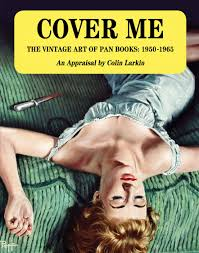
Paperback artwork isn't a subject that I'd ever thought about much (except perhaps in the context of my own books) until I bumped into the American expert Art Scott at the Las Vegas Bouchercon, not far short of twenty years ago. I bought a copy of Art's book about Robert McGinnis's artwork and although Colin Larkin is interested in an imprint rather than an individual artist, he is clearly as expert as Art Scott. He discusses many of the artists responsible for Pan covers and among other things, I learned the - to me, rather amazing - fact that the Pan piper logo was originally designed by Mervyn Peake.
This is a book about artwork rather than the novels themselves, but since Pan had a specialism in crime and thriller titles, many novels and authors familiar to crime fans feature here. It's clear that Colin Larkin isn't an Agatha Christie fan, and he is under the mistaken if not uncommon impression that The Mysterious Affair at Styles is a locked room mystery (it's a closed circle mystery, i.e. with a restricted pool of suspects, which is rather different). But this is a tiny quibble - the sort reviewers indulge in just to prove they've read the book! In a volume of this kind what matters is the principal subject matter, and he discusses that in a very informative way.
I was starting to buy cheap paperbacks at or just after the end of the era that Colin Larkin writes about, and to me - in those days - the Pan covers seemed rather old-fashioned. I much preferred Tom Adams' covers for the Christies which appeared under the Fontana imprint. Now, with the distance of time, I've modified my views. The Pan covers seem to capture a particular era, an age of austerity when excitement was perhaps felt to be in short supply. In some cases, they also seem rather sexist, but at the time 'raciness' was considered very appealing. We can learn about social attitudes from a book like this, just as we can from reading the novels themselves. The vivid, occasionally lurid covers played a huge part in selling books in large quantities.
Covers do matter, whether we authors like it or not. And thanks to Colin Larkin and Telos, we can now enjoy an extended glimpse into a vanished world. I was really glad to read this book.
January 4, 2021
Making a Start
This week should get the new year off to a good start, since I'm aiming to deliver a new book to the publishers. This one is called 21 and it's a short story anthology, a collective effort on the part of the members of Murder Squad, the group of northern writers founded by Margaret Murphy back in 2000. Back then, we never dreamed that the group would still be going strong after so many years. And back at the start of last year, we were looking forward to various events to celebrate our 20th anniversary - we even acquired a special logo, as you can see below! Well, we all know what happened about that, but we also planned to produce this book in 2021, and we were delighted when Severn House signed it up.

There are six current members of the Squad: Ann Cleeves, Kate Ellis, Margaret, Cath Staincliffe, Chris Simms, and me. Each of us have contributed three stories - more than half of which are either brand new or haven't previously been published in the UK, while former members John Baker (now retired as a novelist) and Chaz Brenchley (now based in the US) and, by kind permission of his widow Doreen, the late Stuart Pawson have one story each in the book. I've written an editorial intro and Margaret has contributed a foreword. We're happy with the book and we hope our readers will be too.
I tend to avoid making new year resolutions these days. At the moment, mere survival seems a reasonable objective! But I've been writing away over the festive season, and I hope that this blog will occasionally feature extended posts on selected subjects. For instance, I want to talk about Ann's latest novel and Kate's most recent Devonian whodunit, discussing facets of their writing which I find particularly interesting, and musing on the various similarities and differences in our work.
As for 'live' events, it's too soon to know what this year holds in store. Last night I enjoyed catching up online with friends such as Shelly Dickson Carr, Gigi Pandian, Jeff Marks, and Steve Steinbock, whom I've missed seeing at various conventions in the US. This was in lieu or our usual dinner at Malice Domestic, but when we'll next get together in person remains to be seen. Maybe at Bouchercon in New Orleans, if we're really lucky.
And this week I undertake my third week of online lecturing for Adventures Online, on The Art of the English Murder Mystery. I very much enjoy working with various colleagues on these sessions, not least Simon Dinsdale, a former police superintendent with a wealth of great stories. This is a programme aimed currently at American crime fans, but who knows, it may extend to the UK in due course. Fingers crossed!
January 1, 2021
Forgotten Book - Big Ben Strikes Eleven
Happy new year! As I've mentioned, it's going to be a busy one for me in terms of writing projects. I'm also aiming to keep this blog going in 2021 and I hope to include occasional pieces about crime writing technique. My website has finally been revamped, and the updating process will continue in the coming months. Let me encourage you to get in touch via the contact page as well as by comments on this blog if you have any questions or suggestions.
After watching the understandably muted new year celebrations, I thought I'd ring in the new year with a post about a truly forgotten novel which is rather interesting, even if its title isn't as relevant to the story as one might expect.
David Magarshack (1899-1977) is remembered today as a notable translator of Russian, in particular the work of Dostoievsky and Gogol. He was born in Riga when it was within the Russian Empire and he fled to Britain after the First World War because of the antisemitic legal regime in his homeland. He studied at the University of London and tried to make a career in journalism, with limited success. In the 1930s he followed fashion and tried his hand at writing a detective story. The result was Big Ben Strikes Eleven.
The ambition of this novel is illustrated by its sub-title: 'A Murder Story for Grown-Up People'. What does this mean? To a modern reader it seems rather patronising, as if the debut author is saying that most mystery fiction is written for childish minds. I doubt that was his intention. What I think he was probably trying to get at was that he wanted to write about character and motive, to make his book something more than a crossword puzzle type of whodunit. Possibly he saw himself as a Dostoievsky of commercial crime fiction.
The story concerns the death of the rich and (naturally) unpleasant Sir Robert Boniface, who is found shot in his blue limousine. There is a possibility that he committed suicide, although the sub-title kills off that interpretation. We are introduced to a fairly narrow range of suspects, and the detective work is undertaken not by a brilliant amateur but by two Scotland Yard men, Superintendent Mooney and Inspector Beckett.
Dorothy L. Sayers gave the novel a rave review and I must say that the calibre of writing is truly remarkable for someone who had arrived in Britain less than fifteen years before the book appeared in 1934. The prose is a little ponderous, though, perhaps a side-effect of Magarshack's literary ambitions. I've read his second novel, Death Cuts a Caper, but found it fairly turgid, despite some interesting elements in the storyline such as the use of tarot cards. He wrote a third novel (which I haven't yet read) but then abandoned crime for translation, where he achieved much more success. Perhaps he'd discovered that writing murder stories for grown-ups is harder than it looks.
December 31, 2020
A Year for Writing
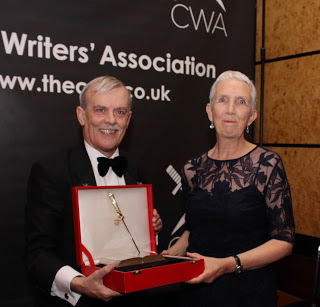
Writing can be hard work, especially when ideas and words don't flow as one would wish, but it's richly rewarding work, which offers a great deal of solace when times aren't easy. For me, and I suspect for many others, writing and reading really have been lifelines in 2020. I'm especially grateful to my readers, many of whom have taken the trouble to get in touch during the past year. And despite everything, the past twelve months have in so many ways been the best of my writing career. Topping all else, naturally, was the award of the CWA Diamond Dagger, presented virtually by Ann Cleeves during an online ceremony. The above photo from the 2017 Daggers dinner, when I presented the award to Ann, is still as close as I've got to handling the actual diamond-encrusted and very valuable award, but I have received my personal dagger!
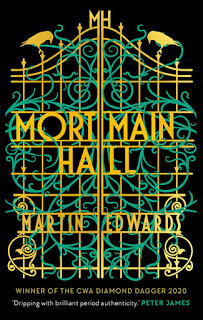
There will be more to say in weeks to come about what I've been working on this year. On the publishing front, it was a year of non-stop activity, with a strong Golden Age focus to many of my projects. I brought out five new books, led by Mortmain Hall. This is a novel that I'm especially proud of, and the reviews in Britain and the US were fantastic. One of the quotes I love is from A.N. Wilson - 'A whole page would not give me space to explain the intricacy of this story. A tangle of satisfying clues and a pleasing denouement in the classic Christie manner.' I was also thrilled to see the book featuring in 'best of the year' lists, notably on CrimeReads and from Ragnar Jonasson. It's truly rewarding to see experts who really know the Golden Age inside out, like Ragnar, Xavier Lechard, and Jose Ignacio Escribano, appreciating the book. The artwork by Ed Bettison for the UK edition attracted a lot of attention and as a result Ed was commissioned by the lovely people at Head of Zeus to produce a new cover in the same style for a welcome reprint of the paperback edition of Gallows Court:
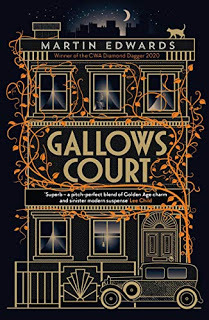
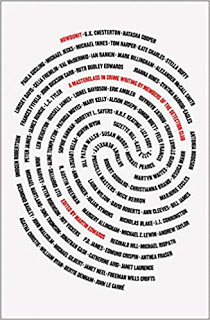
I put together Vintage Crime on behalf of the Crime Writers' Association. Published by Flame Tree Press, this anthology is another beautifully produced book. The stories included chart the evolution of short crime fiction since the CWA was formed nearly seventy years ago, with contributors ranging from Julian Symons to two fine writers of today, Frances Fyfield and Mick Herron.
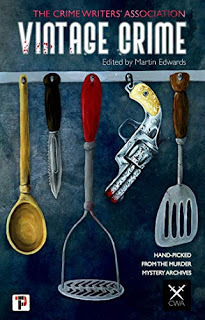
Throughout this testing year, the British Library team somehow managed to continue with their programme of publishing one Crime Classic a month and I contributed introductions to each of them. In particular, there were two more anthologies which I compiled. I have a soft spot for Settling Scores: each story is by a different author and features a different outdoor sport - as far as I know, that's not been done before.
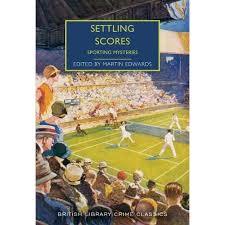
Almost all these books were actually written last year, but the final compilation of 2020 was somehow rushed through during the pandemic in order to meet the deadline for the Christmas books market. It's my fourth collection of short seasonal mysteries for the British Library, A Surprise for Christmas. The title story was written by one of my favourite authors of the past, Cyril Hare.
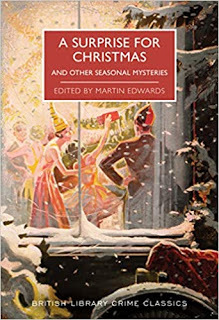
Among the foreign editions of my books, I was particularly delighted by the Chinese translation of The Golden Age of Murder. The publishers were even kind enough to make stamps of my autograph and myself to include in copies, given my inability to attend a book launch! During the year I've enjoyed keeping in touch with a number of people I got to know in China last year, and hope I can get back there before too long.
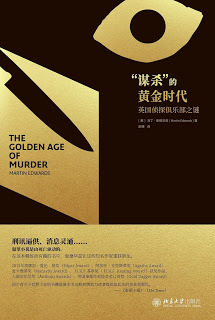
I contributed an essay on 'Plotting' to The Routledge Companion to Crime Fiction, a book I shall be discussing in more detail in the new year. There were also articles for a range of online and print magazines, including CrimeReads, CADS, and NB magazine, plus appreciations in a biography of H.R.F. Keating and Joseph Goodrich's very interesting Unusual Suspects.
As regards short stories, I wrote 'The Observance of Trifles', a jokey short story in the form of a blog post plus comments for In League with Sherlock Holmes, edited by Les Klinger and Laurie King; I am looking forward to receiving my copy and reading the stories by fellow contributors such as Tess Geritsen. I wrote a Golden Age story for My Weekly called 'Respect and Respectability' which is likely to be picked up in a forthcoming anthology; it introduces a new character called Miriam Ackroyd, who may well return again. Another Golden Age story, 'The Locked Cabin', appeared in an 'impossible crime' anthology edited by Maxim Jakubowski and I was extremely gratified the other day to hear that it will be included next year in a collection of the best short stories of the year. All in all, then, a full and (despite the pandemic) exciting year.
And yes, there is more to come in 2021...
December 28, 2020
A Year Like No Other

Crime writers trade in the fragility and unpredictability of human existence, and perhaps that's been quite good training for life in 2020. Like everyone else, I found that the year unfolded in a way that I'd never imagined. Across the world, everyone has had their own challenges to face and for me, these have been the inability to get together with loved ones and friends or to travel and take part in the many events I'd looked forward to. We've all had to find a way of coping which suits us as individuals. From the start of the pandemic it seemed to me that the key thing is to look after one's health: physical, mental, and financial. And also to hope that one isn't unlucky, because in truth, there's a limit to the extent that one can control things. Among other things, I've been fortunate to live in a lovely place and it's been no hardship to spend more time there than usual.
I did manage a few events at the start of the year: a book club event in our local village, the Detection Club AGM and dinner in February (although with hindsight, the spooky emptiness of the train to London was a harbinger of things to come), and a lovely trip to Loughborough University, doing events with Professor Mike Wilson and his students, who were working on a theatrical performance of a Jefferson Farjeon story.
In April, I celebrated (in a locked down sort of way!) 40 years as a qualified solicitor. I'd expected to retire, but in fact I've carried on working part-time as a consultant and in this strange year I've been glad to stay in touch, remotely, with my other working life. Two lecture trips on the Queen Mary 2 were scrapped, but their place has been taken by two weeks of online lecturing for Adventures Online, with more in the pipeline. I've got to know - again remotely - a fascinating chap called Simon Dinsdale, a retired superintendent with a fund of stories. We've started working together online and I hope this can continue next year.
One decision I took at the start of the pandemic was to do as much writing and writing-related stuff as circumstances allowed. This has worked out really well. At the start of the year, I was fretting about whether I'd be able to meet various deadlines. As it turned out, I even managed to add a few more projects into the bargain. So despite the disappointment of not having personal contact with so many people whose company I wanted to share, technology has filled some of the gaps, and although Facetime and Zoom are definitely not the same, they are much, much better than nothing. As for those friends who have suffered this dreadful illness or the effects of 'long covid', my heart goes out to them.
I'm full of admiration for the people who have worked tirelessly to make online events happen. I'm really grateful to Barbara Peters of Poisoned Pen, Sarah Ward and Buxton International Festival, Manjiri and the team at Pune International Literary Festival, the lovely people at UK Crime Book Club, Nick Wells and Flame Tree Press, Dea Parkin, Antony Johnston, and the CWA, Bonnie MacBird and the CWA London chapter, and Giles Ramsay and the Adventures Online team. Inevitably it's a selective list, but doing online events with other people has brightened my year immeasurably.
Reading has, as always, been highly therapeutic. I've also done quite a lot of comfort TV watching, including the Carmichael and Petherbridge Lord Peter Wimsey series, which stand the test of time pretty well, loads of Ruth Rendell Mysteries, and the utterly brilliant Spooks. But I've stopped watching the TV news! My travelling has been restricted to short covid-compliant breaks, but this at least enabled me to undertake quite a lot of research for the novel I recently started to write. Hardcastle Crags, Kinver Edge, and Calke Abbey all proved to be quite inspirational settings. Not to mention seeing the National Rhubarb Collection at Clumber Park - though I'm not sure how I could work that into a story! And before this extraordinary year ends, I'll reflect further on my writing life in 2020.
December 23, 2020
Merry Christmas!
This is my last post before Christmas, although I've scheduled a post about a classic wintry mystery for 25th December as a little treat for locked room puzzle fans in particular. So let me wish everyone who looks at this blog, whether regularly or just on the odd occasion, a very merry Christmas. I hope you have ample opportunity to relax and enjoy the day, even if the consequences of this wretched pandemic mean that it's not possible for you (as it isn't for me, sadly) to be with all your loved ones this year.
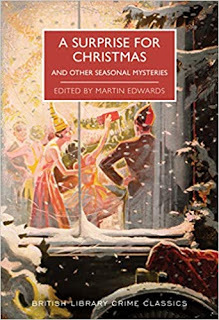
This time last year, none of us could have guessed how 2020 was going to unfold. None of us have lived through anything like it. I'm sure I'm not the only crime writer who has spent even more time than usual in an imagined world. In times like these, escapism has a lot to recommend it.
Despite everything, there have been some positives and I'll review some of the year's happier developments another day. Suffice to say that this year I've done more crime writing, fact and fiction, than ever before. I'll be giving more news about what I've been up to before long.
Meanwhile, be kind to yourselves. Have a good time and thank you very much for reading.
December 21, 2020
Repression - 2020 film review
I'm not quite sure what to make of Repression, a recent film also known as Marionette. Is it an ambitious and interesting failure, an unusual suspense story, an entertaining horror movie, or a film that collapses into incoherence - or perhaps all of those things? I was attracted to it by the cast and the claim that it's a 'Hitchcock-esque' thriller, but it's not a description that makes a lot of sense (and a cynic would say this is in keeping with some aspects of the script). It's a film that bears little resemblance to any Alfred Hitchcock movie I've ever seen.
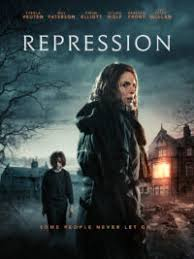
In the opening scene, a man climbs to the top of a tower, says a few words, pours petrol on himself and lights a match...It's a horrific scene, not explained for some time. We then shift to the arrival in Scotland of Marianne (Theklan Reuten), a gloomy therapist who has taken up a new job in a new country. We gather that she's left north America after some tragedy in her life. She starts work alongside colleagues played by Bill Paterson and Rebecca Front, two highly appealing and reliable actors who only have small parts, but give the film a sense of solidity in its early stages.
Marianne is dealing with some very troubled children, including a deeply disturbed boy (Elijah Wolf) who draws pictures of disasters and, it seems, has some gift for foretelling the future. She does her best to relate to him, and in her spare time she find solace in a local book club - which seems to meet with astonishing regularity compared to every book group I've ever encountered. These scenes, which have considerable potential, are in fact rather disappointing as the script shoe-horns in various pretentious observations which seem to connect to the themes of the story. It's all a bit clunky.
Marianne finds herself attracted to an affable chap called Kieron, but it's soon clear that this relationship isn't going to end well. Never mind her patients, she too begins to disintegrate mentally. And the plot twists come thick and fast...
As I've often said, I like ambition in a storyline. There are some good ideas here, and the film is well-made, so I remained engaged, despite a series of highly unlikely developments. Overall, though, it doesn't work as well as it might have done. Perhaps the writing wasn't disciplined enough. I suppose my final verdict is that Repression is an interesting failure. But that's a lot better than being a boring failure.
December 18, 2020
Forgotten Book - Catt Out of the Bag
Clifford Witting was a very capable writer and in reviewing a couple of his books, I've mentioned that he is not only a competent (and sometimes excellent) plotter, he also leavens his stories with pleasing humour. A couple of shrewd judges have told me good things about Catt out of the Bag, which first appeared in 1939, and thanks to the initiative and enterprise of a small press called Galileo, those of us who haven't read it are now able to enjoy the book ourselves.
This is a Christmas mystery and its strength lies in the first hundred pages, with an enjoyable account of a tour around the small town of Paulsfield by a group of carol singers marshalled by the formidable Mrs de Frayne. Among them is the amiable bookseller John Rutherford, who narrates - as in the enjoyable Midsummer Murder.
One of the carol singers is a man called Vavasour, who disappears mysteriously during the evening, along with his collecting box. He hasn't gone home, but the following day, when Rutherford and a new friend who rejoices in the name Cloud-Gledhill make enquiries, his wife behaves suspiciously. Vavasour is a commercial traveller, and she maintains that he's had to go off on business. But her story isn't credible.
I feel that Witting was, on the evidence of the books of his that I've read, a writer after my own heart. He was trying to do something a bit different with his novels, rather than simply follow a well-worn pattern. This approach is appealing but - believe me! - it can have its drawbacks. In this case, I felt that the story faltered after the discovery of a corpse. The murder puzzle is quite neatly contrived, with a good 'least likely person' culprit, but the pleasure of the surprise is weakened because the murder motive is thin, with inadequate foreshadowing. So on the whole the story isn't quite as good as I'd hoped, but I'm glad to have read it and the quality of the early chapters provides clear evidence of Witting's ability to entertain.
December 16, 2020
Reflections on Howdunit
You never quite know how people will react to a book on which you have laboured long and hard. I guess the truth is that simply getting a reaction is positive. Almost anything is better than having your work ignored! But of course it's better if readers 'get' what you are trying to do. So I've been delighted to see that Howdunit has featured prominently in lists of best crime books of the year.
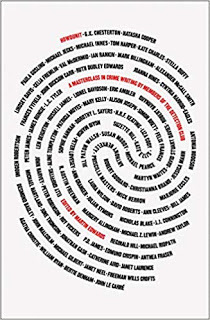
Jake Kerridge picked it as one of his favourites in the Daily Telegraph and Barry Turner did likewise in the Daily Mail. Among crime novelists, Christopher Fowler featured the book as one of his own picks, and so did the very knowledgeable commentator Ayo Onatade, writing for Shots.
This is all very heartening, for me and for the contributors, perhaps especially those writers who haven't published much in the last few years. I was so pleased that it was possible to include contributions from the likes of June Thomson (a fine writer whose early work often drew comparisons to P.D. James), Michael Hartland, Michael Pearce, and two peers of the realm, Bertie Denham and Janet Neel. And I was grateful to Len Deighton, Liza Cody, Kate Ellis, Peter Lovesey, and Mike Lewin for sourcing some of the illustrations which I think add another dimension to the material (for instance, Kate's flow chart of one of her plots and the Clewsey cartoons).
Revenue from the publication of this book will help to sustain the Detection Club as it heads towards its centenary in 2030. I'm hopeful that beginning writers will find the range of tips extremely useful and also that readers who have no ambitions to write but are intrigued by the writing process and the ups and downs of writers' lives will find it entertaining and informative. So if you're looking for last minute Christmas ideas for the crime fans in your life....
December 15, 2020
Pune International Literary Festival and online events
Despite the cancellation of so many literary events this year, there has been no lack of enterprise on the part of organisers all around the world. Online events may lack - to an extent - the personal touch but they represent a very welcome way of keeping in touch with fellow writers and readers. Last week, for instance, I enjoyed being interviewed by Bonnie MacBird (and briefly by Les Klinger) for a CWA London chapter event.
This week I'm involved in a series of lectures and discussions for Adventures Online - the online version of Road Scholar, who run the Queen Mary trips with which I was involved last year, and much else besides. These courses are aimed primarily at American crime fans, and if you are interested in taking part, do take a look at the Road Scholar/Adventures Online website.
On Saturday I had the great pleasure of being a special guest of the Pune International Literary Festival. Manjiri Prabhu, the crime writer who leads the Festival, is someone I've known for a number of years, and there have been various plans for me to get out to India to take part. These didn't come to fruition for various reasons and this year, of course, there was no chance. But undaunted, Manjiri was kind enough to invite me to take part in a very well-organised online version of the Festival.
Sarah Ward, a writer of high calibre, kindly agreed to interview me and I really enjoyed the event. If you'd like to take a look at it, I believe that a recording will be posted on Youtube shortly. Of course, it's not the same as going to India and meeting everyone face to face, but an online event is far better than any alternative and my thanks go to the organisers for all their hard work in difficult circumstances.




